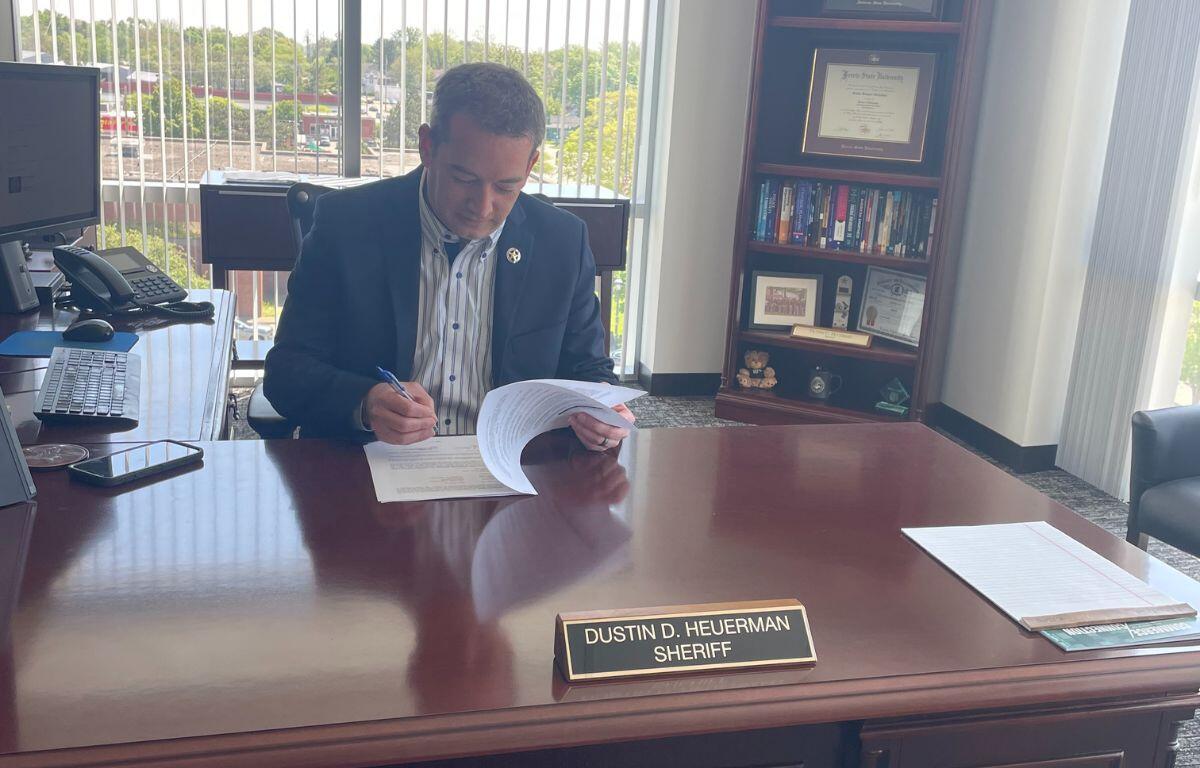URBANA, IL (Chambana Today) – Six years into his role as Champaign County Sheriff, Dustin Heuerman is leading a department that has undergone major transformation—from a new administrative home to initiative-taking efforts around public safety, mental health, and community trust.
Sheriff Heuerman now oversees more than 150 employees, including deputies, investigators, and administrative staff, from the fourth floor of the Scott M. Bennett Administrative Building in downtown Urbana. The move, he said, was necessary after the former sheriff’s office—dating back to 1980—became rundown and unsafe, with issues including mold and rodents.
“I recommended we look at the building next door, and eventually, that’s where we moved,” Heuerman recalled.
A Complex Operation
The sheriff’s current headquarters includes conference rooms, internal investigation spaces, interrogation rooms equipped with similar technology as their body and in-car cameras, and even a tech room for cyber investigations, which supports child pornography cases and digital evidence processing. Evidence from every room is secured in centralized vaults on-site. There’s also a command post—ready for protests, tornadoes, or highway emergencies—that previously operated from a basement location at METCAD.
The facility reflects a modern approach to law enforcement and is designed with both function and transparency. Investigators have private meeting rooms, and bilingual translators are brought in when needed during interviews. A fitness center in the basement supports the physical and emotional well-being of the sheriff’s staff.
Balancing Law, Public Trust, and Policy
Heuerman emphasizes that effective policing is rooted in community trust—especially in a county where 56 sworn deputies patrol over 1,000 square miles. He’s active in recruitment and job fairs, particularly for corrections roles that remain difficult to staff. There are also employee referral incentives in place to bolster hiring.
“My deputies come from this community,” he said. “They are dedicated and everyone works extremely hard. But we need the public to trust us to keep crime down.”
Heuerman is especially concerned about the chilling effect immigration fears can have on crime reporting, particularly in serious cases like sexual assault or gun violence. “I’m not concerned about your status,” he stated. “My office will never turn someone over to ICE. We want to solve the crime.”
Addressing Gun Safety and Opioid Addiction
Gun violence remains a top issue. While Heuerman acknowledges that most gun owners act responsibly, he warns against leaving firearms in vehicles, even locked.
“It’s just common sense,” he said. “We don’t want guns in the wrong hands.”
He’s also alarmed by the ongoing fentanyl crisis and the high rate of repeat overdoses deputies respond to. “We see some of the same people week after week,” he said.
In many of those cases, deputies aren’t sure whether someone died of an overdose until Coroner Laurie Brauer performs an autopsy. Heuerman says community resources are essential to tackling addiction at its roots, but wait times for care remain a challenge.
Rethinking Emergency Response
Heuerman serves on the regional committee for CESSA—the Community Emergency Services and Supports Act—which evaluates how law enforcement and social services respond to crises. He supports expanding the role of social workers but stresses that they still need backup from trained, armed officers to ensure everyone’s safety.
“More than half the time, deputies arrive at a call that end up being mental health related. Sometimes, it’s the other way around,” he said. “We need a balanced system before we can reduce law enforcement’s role.”
The task force is also examining how responses differ between urban centers and rural areas, where resources are scarcer and backup is often miles away.
Looking Ahead
When asked about his future, Heuerman confirmed he will run for office again once his second term ends. As for the political nature of the role, he offered a measured response.
“My job as sheriff is to uphold criminal law and take criminals off the streets,” he said. “My top responsibilities are keeping the public safe and ensuring my staff acts ethically and constitutionally.”
With a modern office, new technologies, and an eye toward public trust, Sheriff Heuerman is shaping the department to meet today’s challenges while laying groundwork for the future.
For more information about the Champaign County Sheriff’s Office, visit the Champaign County Sheriff’s website.







